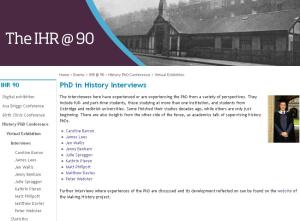
Last year I was interviewed about my experiences of the PhD as part of the IHR’s celebration of the 90th anniversary of the PhD in Britain. I don’t claim to be an expert or necessarily to have anything particularly interesting to say on the subject as every experience of the PhD is very much individual and varies considerably. After giving the interview I must admit that I largely forgot about it and the subject. However, recently (as my previous blog post highlights) the subject of History in a Higher Education context has been on my mind. I therefore decided to revisit my interview and those others that were conducted. I found myself very much interested by the similarities and differences between experiences but also by the opinion of the PhD expressed once on the other side of the Viva.
Funding and ‘staying-power’ kept cropping up as important. Those without funding noted the added difficulty of carrying out a PhD whilst also working. Those with funding not only had money matters alleviated but felt ‘endorsed’ as doing something worthwhile. The ability to undertake a PhD lies in-part in a person’s ability to stay on course and to really want to do the subject. A PhD is a marathon not a race!
When asked about why each person choose their topic it became immediately clear that in many cases the topic finds the student either through the special subject many take in their third year of undergraduate study or by random luck of circumstance, potential supervisor or university expertise. As for why they studied history in the first place many state quite openly that they simply fell into it and never really escaped! There were variations in these experiences. Julie Spraggon, for instance, mentions how it is important to find a niche – something that has not been explored too much, while Kathrin Pieren talked about ‘collaborative PhD’s, in her case between the Centre for Metropolitan History at the IHR and the Museum of London.
 In addition, Professor Caroline Barron noted the rising necessity of the PhD in the provision of academics. When she did her PhD in the 1960s she was able to get a lectureship (as did many of her colleagues) before completion – something unheard of today.
In addition, Professor Caroline Barron noted the rising necessity of the PhD in the provision of academics. When she did her PhD in the 1960s she was able to get a lectureship (as did many of her colleagues) before completion – something unheard of today.
Perhaps the most interesting question was what each person felt they got out of their PhD’s. The straight forward answer was a stronger sense of how to carry out research, to meet deadlines, organise time, editing skills and how to write clearly and concisely. Also highlighted was skills in perseverance and learning to go with your gut instinct. One thing that doing a PhD seems to also give each person is a new appreciation of the world and perhaps a new perspective. A PhD does not just give specific historical knowledge but also a wider viewpoint of the world and of ways of thinking about it.
Resources:
The History PhD virtual exhibition Interviews
The History PhD: Past, Present and Future conference podcasts
